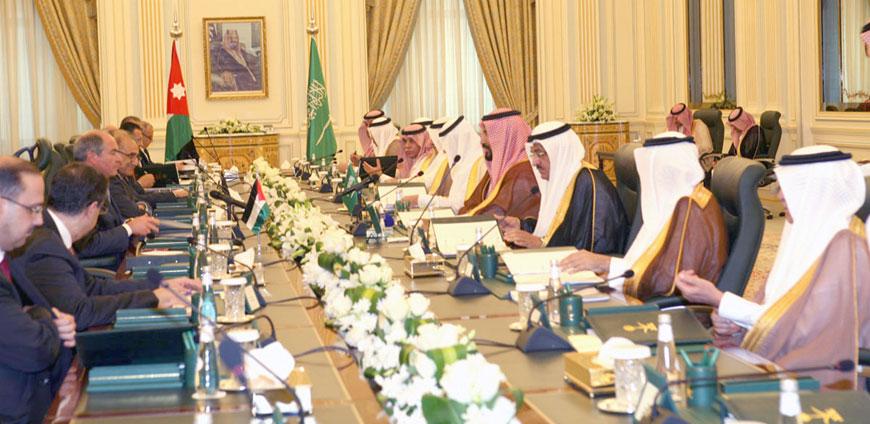You are here
Jordan, Saudi Arabia sign MoU on joint investments
By JT - Aug 25,2016 - Last updated at Aug 25,2016

Prime Minister Hani Mulki attends the signing of a MoU between the Kingdom and Saudi Arabia, signed by Deputy Prime Minister for Economic Affairs Jawad Anani (left) and Yasir Al Rumayyan, secretary general of the Saudi Public Investment Fund, in Amman on Thursday (Petra photo)
AMMAN — Jordan and Saudi Arabia on Thursday signed a memorandum of understanding (MoU) aimed at boosting joint investments in Jordan, the Jordan News Agency, Petra, reported.
Deputy Prime Minister for Economic Affairs Jawad Anani — who is also the minister of industry, trade and supply and a Jordan Investment Fund board member — and Yasir Al Rumayyan, secretary general of the Saudi Public Investment Fund, signed the MoU on behalf of Jordan and Saudi Arabia, respectively.
Prior to the signing ceremony, Prime Minister Hani Mulki met with Rumayyan over measures to be followed to go on with joint economic projects both countries had agreed upon.
King's Special Envoy to Saudi Arabia Bassem Awadallah and Chief Commissioner of the Aqaba Special Economic Zone Authority Nasser Shraideh attended the meeting.
The agreement stipulates that Saudi Arabia invests in the Kingdom, particularly in the energy, tourism and infrastructure sectors, in addition to providing an investment environment that would attract local and international investors, Petra added.
The deal follows His Majesty King Abdullah's visit to Saudi Arabia in April, where he met with King Salman Bin Abdulaziz and agreed to establish a Saudi-Jordanian coordination council, based on both countries’ willingness to boost bilateral relations and cooperation in all fields.
The council is aimed at developing and deepening strategic relations between the two countries in the fields referred to in the joint statement issued [in Aqaba] on April 11, 2016.
Its mission also entails holding political consultation and coordination on bilateral, regional and international issues and enhancing existing cooperation between the two countries in all fields in a way that achieves the aspirations of both leaders and peoples.
The council will hold its meetings regularly by rotation between the two countries.
The move was followed by establishing the Jordan Investment Fund (JIF) under a law enacted for the purpose of offering special incentives to investors and specifying the projects targeted by the fund.
Awadallah had told Bloomberg that Saudi Arabia would invest billions in projects in Jordan.
The JIF law stipulates that the fund has the right to possess, invest and develop the following projects: the national railway network, the electricity interconnectivity project with Saudi Arabia, the pipeline to transfer crude oil and fuel derivatives to the Jordan Petroleum Refinery Company, and consumption and storage points, developing infrastructure at the Custodian of the Two Holy Shrines City project and a recreational estate project in Matal in Aqaba, in addition to other projects that the Cabinet approves, based on a recommendation from the fund’s board of directors.
Stakeholders, including sovereign funds and local, Arab and foreign investment institutions are to establish a shareholding company or more to invest in development rights and in projects listed in the law.
The government will be authorised to administer treasury assets and forestlands for the purposes of implementing the projects included in the law, and the fund will enjoy special incentives and exemptions from taxes.
Related Articles
AMMAN — Prime Minister Hani Mulki on Tuesday met with Ahmad Al Khatib and Maj. Gen.
AMMAN — Jordan and Saudi Arabia on Wednesday signed agreements of cooperation as the first meeting of the Saudi-Jordanian Coordination Counc
AMMAN — The Lower House on Sunday referred the draft investment fund law for 2016 to its Economy and Investment Committee for review amid re

















